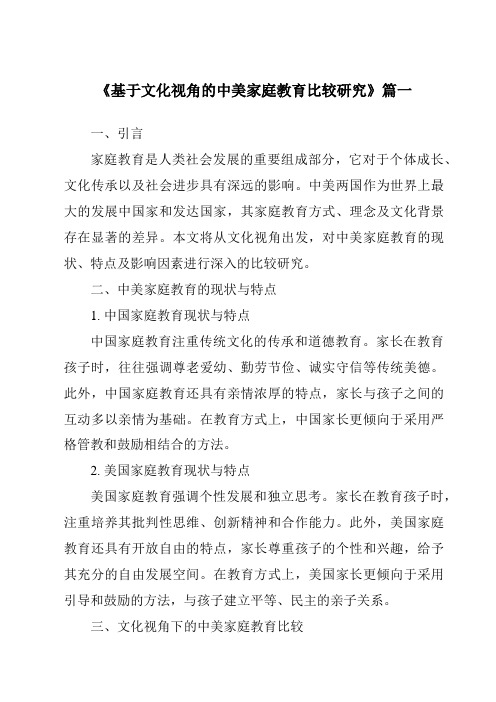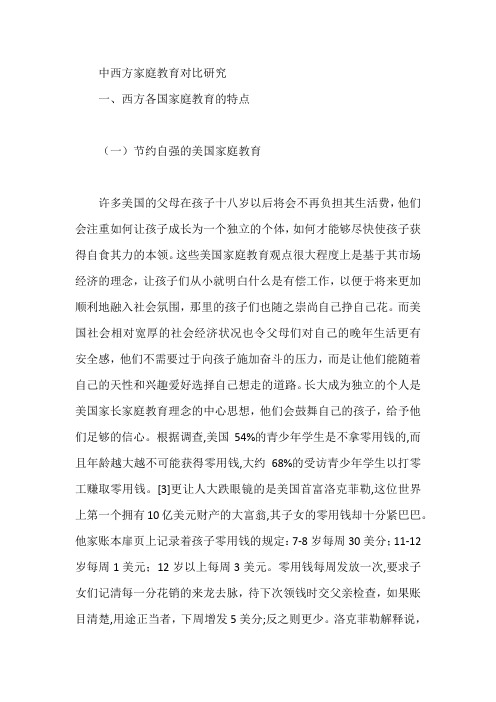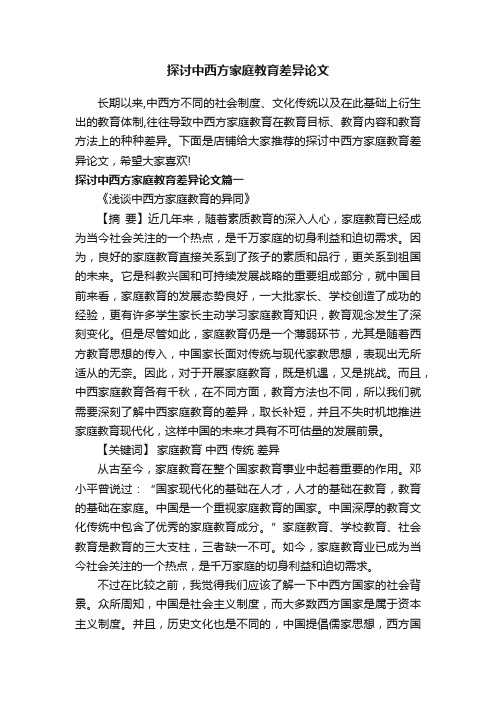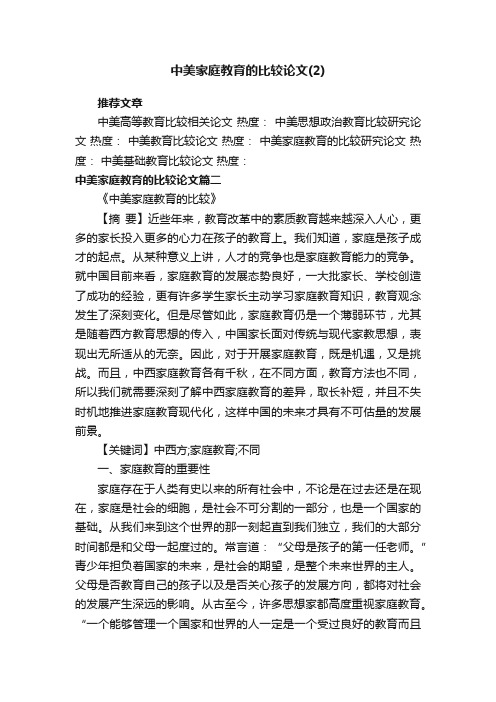浅析中美家庭教育差异毕业论文
浅谈中美家庭教育的差异

浅谈中美家庭教育的差异摘要:21世纪国际竞争日益激烈,而这种竞争归根结底是人才培养的竞争,培养人才必经之路是:家庭教育、学校教育和社会教育。
人才培养的首要阵地是家庭,家庭教育在整个教育过程中扮演着及其重要的角色,也是全社会合教育环节中最重要的一环。
家庭教育指的是家庭互动过程中父母对儿女的成长发展所产生的教育。
但是时至今日,我国不少家庭教育存在着误区。
因此,本文主要剖析中美家庭教育的差异,试图通过比较,借鉴美国家庭教育中有价值的实践,不能断言美国的家庭教育是完全理想化,但是我们取其精华,去其糟粕。
进而为我国家庭教育的改革提供借鉴。
关键词:家庭教育中国美国同样是现代社会,同样有重视家庭教育的父母,但是中美的家庭教育存在着明显的差异。
综合来看,造成不同的教育原因有以下方面:1)历史背景的差异:美国历史比较短,旧的思想文化保留得少,在多元化思想价值观的影响下能够较快的接受新的思想和文化,发展的约束较少;而中国历史文化悠久,同时所受旧有的约束较多,这种封建思想早已在人们脑里根深蒂固。
2)社会条件的差异:美国经济条件好,社会养老保障健全。
孩子培养到18岁并成为一个独立自主的个体,他们未来的路全靠他们自己去奋斗,父母不必为他们的未来生活过于担心,父母老了可以进养老院度过晚年,所以父母并不把养儿育女当成防老的作用。
而中国经济条件比不上美国,另外社会养老保障不健全又存有旧的思想观念,对孩子的教育从个人养老或个人荣誉面子角度考虑比较少,他们把孩子当作私有财产,要孩子知恩图报,长大后好好报答父母。
3)文化传统的差异:美国的文化核心是重个性,美国人是以个人为本的个体主义,注重个人利益,崇尚个人发展,实现自我。
在家庭中,父母倾向于把自身与孩子看成是两个独立的个体,个体具有最高的价值。
子女的自我价值体现在父母尊重孩子的个人选择、兴趣爱好;父母的自我价值体现在父母注重个人生活享受,平时决不会为了孩子而放弃去听音乐会、看电影或约会。
浅析中美家庭教育的差异

浅析中美家庭教育的差异一、本文概述家庭教育,作为个体成长的摇篮和社会文化的基石,对儿童的性格塑造、价值观形成和人生观念有着深远影响。
随着全球化的进程加速,不同文化背景下的家庭教育方式逐渐进入公众视野,引发了广泛讨论。
本文旨在浅析中美两国在家庭教育方面的主要差异,通过对比两国的家庭教育理念、实践方式及其背后的社会文化因素,以期增进对两国教育文化的理解,并为家庭教育实践提供多元视角的参考。
本文首先将对中美家庭教育的传统理念进行概述,分析两国在家庭角色定位、教育目标设定等方面的异同。
接着,通过具体案例和统计数据,展示中美家庭在教育实践中的具体做法,如教育方式、亲子互动模式等。
然后,本文将从社会文化层面探讨导致这些差异的根本原因,包括历史传统、社会价值观、教育制度等方面的因素。
本文将对中美家庭教育的差异进行反思,提出在全球化背景下如何借鉴彼此优点,促进家庭教育质量的提升和儿童全面发展。
二、中美家庭教育的历史与文化背景中美两国在家庭教育的历史和文化背景上存在着显著的差异,这些差异在很大程度上塑造了各自家庭教育的方式和理念。
在中国,家庭教育的历史源远流长,深受儒家文化的影响。
儒家文化强调家庭伦理、孝道、尊重和服从长辈等观念,这些观念在家庭教育中得到了充分体现。
传统上,中国的家庭教育注重培养子女的道德品质、礼仪规范和社会责任感,强调子女对家庭的忠诚和孝顺。
在这种文化背景下,中国的家庭教育往往更加注重集体主义和团队精神的培养,鼓励子女为家庭、社会和国家的利益而努力奋斗。
相比之下,美国的家庭教育历史较短,更多地受到西方个人主义和民主主义的影响。
在美国文化中,个人主义被高度重视,强调个人的自由、独立和权利。
因此,美国的家庭教育更加注重培养子女的独立思考能力、自主决策能力和创新精神。
美国家长倾向于鼓励子女追求自己的梦想,注重培养他们的自信心和竞争力。
美国的家庭教育也强调尊重个体的差异和个性发展,鼓励子女探索自己的兴趣和才能。
《基于文化视角的中美家庭教育比较研究》范文

《基于文化视角的中美家庭教育比较研究》篇一一、引言家庭教育是人类社会发展的重要组成部分,它对于个体成长、文化传承以及社会进步具有深远的影响。
中美两国作为世界上最大的发展中国家和发达国家,其家庭教育方式、理念及文化背景存在显著的差异。
本文将从文化视角出发,对中美家庭教育的现状、特点及影响因素进行深入的比较研究。
二、中美家庭教育的现状与特点1. 中国家庭教育现状与特点中国家庭教育注重传统文化的传承和道德教育。
家长在教育孩子时,往往强调尊老爱幼、勤劳节俭、诚实守信等传统美德。
此外,中国家庭教育还具有亲情浓厚的特点,家长与孩子之间的互动多以亲情为基础。
在教育方式上,中国家长更倾向于采用严格管教和鼓励相结合的方法。
2. 美国家庭教育现状与特点美国家庭教育强调个性发展和独立思考。
家长在教育孩子时,注重培养其批判性思维、创新精神和合作能力。
此外,美国家庭教育还具有开放自由的特点,家长尊重孩子的个性和兴趣,给予其充分的自由发展空间。
在教育方式上,美国家长更倾向于采用引导和鼓励的方法,与孩子建立平等、民主的亲子关系。
三、文化视角下的中美家庭教育比较1. 文化传统与价值观中国文化传统注重集体主义和和谐,而美国文化传统强调个人主义和竞争。
这种文化差异导致了两国在家庭教育方面的不同。
中国家庭更注重传统道德的传承,而美国家庭则更注重培养孩子的独立思考和创新能力。
2. 家庭教育方式与理念中国家庭教育方式以严格管教和鼓励相结合为主,注重规范孩子的行为和塑造其性格。
而美国家庭教育方式则更加开放自由,尊重孩子的个性和兴趣,鼓励其探索和创新。
此外,美国家长在教育过程中更注重与孩子的沟通和互动,建立平等的亲子关系。
3. 家庭环境与亲子关系中国家庭环境具有浓厚的亲情氛围,家长与孩子之间的互动多以亲情为基础。
而美国家庭则更加注重培养孩子的独立性和自主性,家长与孩子之间的互动更加平等和民主。
这种差异导致了两国孩子在成长过程中形成不同的性格特点和行为习惯。
中西方家庭教育对比研究【论文】

中西方家庭教育对比研究一、西方各国家庭教育的特点(一)节约自强的美国家庭教育许多美国的父母在孩子十八岁以后将会不再负担其生活费,他们会注重如何让孩子成长为一个独立的个体,如何才能够尽快使孩子获得自食其力的本领。
这些美国家庭教育观点很大程度上是基于其市场经济的理念,让孩子们从小就明白什么是有偿工作,以便于将来更加顺利地融入社会氛围,那里的孩子们也随之崇尚自己挣自己花。
而美国社会相对宽厚的社会经济状况也令父母们对自己的晚年生活更有安全感,他们不需要过于向孩子施加奋斗的压力,而是让他们能随着自己的天性和兴趣爱好选择自己想走的道路。
长大成为独立的个人是美国家长家庭教育理念的中心思想,他们会鼓舞自己的孩子,给予他们足够的信心。
根据调查,美国54%的青少年学生是不拿零用钱的,而且年龄越大越不可能获得零用钱,大约68%的受访青少年学生以打零工赚取零用钱。
[3]更让人大跌眼镜的是美国首富洛克菲勒,这位世界上第一个拥有10亿美元财产的大富翁,其子女的零用钱却十分紧巴巴。
他家账本扉页上记录着孩子零用钱的规定:7-8岁每周30美分;11-12岁每周1美元;12岁以上每周3美元。
零用钱每周发放一次,要求子女们记清每一分花销的来龙去脉,待下次领钱时交父亲检查,如果账目清楚,用途正当者,下周增发5美分;反之则更少。
洛克菲勒解释说,“过多的财富会给自己的子孙带来灾难”。
这句蕴含着他人生经验的话,就像他的财富,引发人们的思考。
(二)磨练吃苦的英国家庭教育英国作为世界上第一个工业化国家,英语又是全世界使用频率极高的语言,总的来说,英国人性格恪守传统,他们的象征动物是约翰牛,即严谨而且爱独居,为了自己获得独立自由而愿意吃苦耐劳来换取理想生活。
英国的青少年,从小就体验送报、打工等劳动的辛苦,这本身就是磨炼吃苦精神的绝佳途径。
在寒冷的冬天,当中国的同龄孩子可能还在热被窝里撒娇,赖床时要父母三请四催说尽好话,英国的孩子早已起来挨家挨户去送报了。
探讨中西方家庭教育差异论文

探讨中西方家庭教育差异论文长期以来,中西方不同的社会制度、文化传统以及在此基础上衍生出的教育体制,往往导致中西方家庭教育在教育目标、教育内容和教育方法上的种种差异。
下面是店铺给大家推荐的探讨中西方家庭教育差异论文,希望大家喜欢!探讨中西方家庭教育差异论文篇一《浅谈中西方家庭教育的异同》【摘要】近几年来,随着素质教育的深入人心,家庭教育已经成为当今社会关注的一个热点,是千万家庭的切身利益和迫切需求。
因为,良好的家庭教育直接关系到了孩子的素质和品行,更关系到祖国的未来。
它是科教兴国和可持续发展战略的重要组成部分,就中国目前来看,家庭教育的发展态势良好,一大批家长、学校创造了成功的经验,更有许多学生家长主动学习家庭教育知识,教育观念发生了深刻变化。
但是尽管如此,家庭教育仍是一个薄弱环节,尤其是随着西方教育思想的传入,中国家长面对传统与现代家教思想,表现出无所适从的无奈。
因此,对于开展家庭教育,既是机遇,又是挑战。
而且,中西家庭教育各有千秋,在不同方面,教育方法也不同,所以我们就需要深刻了解中西家庭教育的差异,取长补短,并且不失时机地推进家庭教育现代化,这样中国的未来才具有不可估量的发展前景。
【关键词】家庭教育中西传统差异从古至今,家庭教育在整个国家教育事业中起着重要的作用。
邓小平曾说过:“国家现代化的基础在人才,人才的基础在教育,教育的基础在家庭。
中国是一个重视家庭教育的国家。
中国深厚的教育文化传统中包含了优秀的家庭教育成分。
”家庭教育、学校教育、社会教育是教育的三大支柱,三者缺一不可。
如今,家庭教育业已成为当今社会关注的一个热点,是千万家庭的切身利益和迫切需求。
不过在比较之前,我觉得我们应该了解一下中西方国家的社会背景。
众所周知,中国是社会主义制度,而大多数西方国家是属于资本主义制度。
并且,历史文化也是不同的,中国提倡儒家思想,西方国家提倡文艺复兴。
但是最重要的一点就是他们对家庭教育地位的态度也是不同的。
中美家庭教育的比较论文(2)

中美家庭教育的比较论文(2)推荐文章中美高等教育比较相关论文热度:中美思想政治教育比较研究论文热度:中美教育比较论文热度:中美家庭教育的比较研究论文热度:中美基础教育比较论文热度:中美家庭教育的比较论文篇二《中美家庭教育的比较》【摘要】近些年来,教育改革中的素质教育越来越深入人心,更多的家长投入更多的心力在孩子的教育上。
我们知道,家庭是孩子成才的起点。
从某种意义上讲,人才的竞争也是家庭教育能力的竞争。
就中国目前来看,家庭教育的发展态势良好,一大批家长、学校创造了成功的经验,更有许多学生家长主动学习家庭教育知识,教育观念发生了深刻变化。
但是尽管如此,家庭教育仍是一个薄弱环节,尤其是随着西方教育思想的传入,中国家长面对传统与现代家教思想,表现出无所适从的无奈。
因此,对于开展家庭教育,既是机遇,又是挑战。
而且,中西家庭教育各有千秋,在不同方面,教育方法也不同,所以我们就需要深刻了解中西家庭教育的差异,取长补短,并且不失时机地推进家庭教育现代化,这样中国的未来才具有不可估量的发展前景。
【关键词】中西方;家庭教育;不同一、家庭教育的重要性家庭存在于人类有史以来的所有社会中,不论是在过去还是在现在,家庭是社会的细胞,是社会不可分割的一部分,也是一个国家的基础。
从我们来到这个世界的那一刻起直到我们独立,我们的大部分时间都是和父母一起度过的。
常言道:“父母是孩子的第一任老师。
”青少年担负着国家的未来,是社会的期望,是整个未来世界的主人。
父母是否教育自己的孩子以及是否关心孩子的发展方向,都将对社会的发展产生深远的影响。
从古至今,许多思想家都高度重视家庭教育。
“一个能够管理一个国家和世界的人一定是一个受过良好的教育而且能成功地支撑起自己家庭的人。
”正如中国儒家学说所论述的,家庭教育是治理国家的基础,所以每一个人都要把国家兴亡和教育联系在一起。
英国思想家JohnLocke认为家庭教育是一个人教育的起点,也起着导向性的作用。
中西方教育差异相关论文

中西方教育差异相关论文中西方教育的差异是一种事实性存在。
造成中西方教育差异的一个重要原因就是中西方对教育概念的原初性定义的差异。
下面是店铺为大家推荐的中西方教育差异相关论文,供大家参考。
中西方教育差异相关论文篇一:父母是子女的第一任教师,家庭教育对人的教育具有不可置换的意义。
中美在家庭教育上存在着显著的差异,不同的观念和培养方式造成了中美两国的儿童在成人后存在着明显的差异。
在东西方社会的制度结构中,家庭制度的地位和作用有很大的不同。
这是造成东西方社会和文化差异的一个基本原因。
中国传统教育强调知识的传授,美国教育强调学生能力的培养,二者需要交流和互补。
通过查阅有关书籍,我们也意识到:中美教育在各个教育层次上都存在着众多差异,并以不同的表现形式体现在生活、学习的各个方面。
在曾芝兰《论中美家庭教育的差异》中记录,家庭教育,按照传统观念,就是在家庭生活中,由家长对其子女实施的教育。
而按照现代观念,家庭教育则是在家庭生活中,家庭成员(包括父母和子女等)之间相互的影响和教育。
家庭教育是大教育的组成部分之一,是学校教育与社会教育的基础。
家庭教育是终身教育,它开始于孩子出生之日(甚至可上溯到胎儿期),婴幼儿时期的家庭教育是“人之初”的教育,在人的一生中起着奠基的作用。
孩子上了小学、中学后,家庭教育既是学校教育的基础,又是学校教育的补充和延伸。
王晓红在《中美家庭教育的差异比较》一文中提到:在中国社会中,家长缺乏科学的教育子女的经验,守着陈旧、落后、错误的教育观念,重教而不会教的现象比较普遍,解决家庭教育实践中的问题和矛盾已经刻不容缓。
在中国,父母关心孩子的事,如帮助孩子洗衣服、整理卧室是很多的。
这也有内在的原因,中国中小学生的课业负担重,由于最终将以分数决定学生所上的高等学校,学生必然重视分数。
与中国的中学生和家长把目光盯在升学上、老师和学校把目光盯在升学率上不同,西方国家更重视兴趣培养。
当然,西方教育也有弊端。
浅谈中美家庭教育的差异

浅谈中美家庭教育的差异一、本文概述家庭教育是人类社会教育的重要组成部分,它对于个体的成长、价值观的形成以及社会文化的传承都起着至关重要的作用。
本文将探讨中美两国在家庭教育方面的差异,旨在揭示两种不同文化背景下家庭教育模式的特色及其影响。
通过对比分析,我们可以更深入地理解家庭教育的多元性,同时也为家长和教育工作者提供跨文化的借鉴和启示。
本文将首先概述中美两国家庭教育的总体特点,然后分析两者在家庭教育观念、教育内容和方法等方面的差异,最后探讨这些差异背后的文化和社会因素。
通过这一研究,我们希望能够促进国际间的教育交流,推动家庭教育理念的创新和发展。
二、中美家庭教育观念的差异中美两国在家庭教育观念上存在着显著的差异,这些差异源于两国不同的文化背景、社会制度和价值观念。
在中国,家庭教育被赋予了极高的重要性,家长们普遍认为教育是塑造孩子未来的关键。
他们强调孩子的学习成绩,注重知识的灌输和应试技巧的培养。
中国家长倾向于为孩子制定明确的学习计划和目标,期望他们在学校和社会中取得优异的成绩。
中国的家庭教育还注重培养孩子的道德品质和社会责任感,强调尊重长辈、孝顺父母等传统美德。
相比之下,美国的家庭教育观念则更加注重孩子的个性发展和兴趣培养。
美国家长更倾向于鼓励孩子追求自己的兴趣和梦想,注重培养他们的创新能力和批判性思维。
他们强调孩子的独立思考和自主选择能力,鼓励孩子尝试不同的活动和学科,以发现自己的潜力和兴趣所在。
美国的家庭教育还注重培养孩子的社交能力和团队协作精神,鼓励他们参与各种社交活动和志愿者工作。
这些差异在一定程度上反映了中美两国社会文化的不同特点。
在中国,由于历史和社会原因,家庭教育被赋予了更多的期望和责任。
家长们普遍认为,只有通过努力学习才能获得更好的未来。
而在美国,由于社会制度和价值观念的不同,家长们更加注重孩子的个性发展和兴趣爱好。
他们认为,孩子的兴趣和梦想是他们成长和发展的动力源泉。
然而,需要注意的是,这些差异并不意味着一种观念优于另一种观念。
- 1、下载文档前请自行甄别文档内容的完整性,平台不提供额外的编辑、内容补充、找答案等附加服务。
- 2、"仅部分预览"的文档,不可在线预览部分如存在完整性等问题,可反馈申请退款(可完整预览的文档不适用该条件!)。
- 3、如文档侵犯您的权益,请联系客服反馈,我们会尽快为您处理(人工客服工作时间:9:00-18:30)。
浅析中美家庭教育差异毕业论文目录课题:浅析中美家庭教育差异一、课题(论文)提纲二、容摘要三、参考文献On the Differences of Family Education between China and America00000000000000AbstractFamily, the first school of life, is the basis and supplement of school education. A person's success largely depends on the Family Education. Modern social development requires highly qualified and talented person, and good family education is the key. As there are many differences in the social system, cultural background and educational purposes between China and America, which also brings the different concept of family education. All countries all over the world are developing the New Century Education Project; they attach great importance to the family education. Although family education has given rise to concerns of the community in our country, especially the great concern of the Education Sector, up to now, there are still misunderstandings in Chinese Family education. In this paper, the author starts from the definition of family education, then make the process comparison of family education between China and America, and then pointes out that the results of the Sino-US Family Education and the problems of Sino-US Family Education. Based on these comparisons of factors, the writer analyzes the reasons for differences family education in the two countries.Key WordsFamily Education ; American Family Education; Chinese Family Education ; Comparison摘要:家庭是人生的第一所学校,是学校教育的基础和补充。
一个人的成功很大程度上取决于家庭教育,现在社会的发展需要高素质的人才。
而良好的家庭教育是培养高素质人才的关键。
由于中美两国在社会制度,文化背景,教育目的等方面的不同,也给家庭教育的观念带来不同。
世界各国在培养新世纪人才的教育工程中,都很重视家庭教育这一环节。
虽然家庭教育在我国已经引起社会各界的关注,特别是教育界的极大关注,但是时至今日,我国家庭教育仍存在着误区。
本文首先从介绍家庭教育的定义入手,然后对中美两国家庭教育的过程进行比较,接着指出中美家庭教育的结果和中美家庭教育各自存在的问题。
根据这些因素的比较,分析形成两国家庭教育差异的原因。
关键词:家庭教育;美国家庭教育;中国家庭教育;比较IntroductionChildren are expectation of their parents and hope of a nation. Family education is not only an important component of education but also the first lesson to a child which will be remembered forever. Family education has a direct influence on the qualities of talents. In the 21st century, international competition is becoming fiercer and fiercer. And it is fundamentally a competition for talents. Thus, each country should pay much attention to family education in the education projects. The issue has been a hot topic in our country, and it has aroused great concern of our government and all levels of society, particularly the education sector. However, many people think that schools and universities have the main responsibility for these problems which has appeared in education recently. Schools and universities are to blame, but their parents are more to blame. If the love of the good, the beauty and the truth had been implanted properly into their mind in early years, if they had been trained to use their minds at the very beginning, they would not live so foolish. In order to find a better way to educate our children, we should study other countries’ experiences. There are many types of family education in the world, and American family education is one of the most famous. So it is necessary and significant to make a comparison of family education between America and China. This paper is to generally compare Chinese family education and American family education which may provide some lessons to family education.Family is the cell of society. Each individual's socialization requires not only the family feeding, but also more families' education. Children are learned to walk, to speak, to live by themselves and to receive physical development, psychological development, personality formation, social life and mastery of basic skills. Children are engagedin playing and learning. As they grow older, they realize that to be independent is to participate in social activities. Families not only provide children with the first game of life and learning spaces, but also guide them to learn from games and work. This guidance is family education.1. Comparison of the process between Chinese and American Family EducationFrom the results of family education, we can see the education process in family. Although the family education is not a System Department of Education, it is still educational goals. Education contents, education methods and those which are the same in the education system play an important role. The goal of education is the most important, which determines the content of family education and methods.1.1Comparison of the contentsThe western parents provide the children a environment for growth resistant to them, and foster their tenacious individuality and the good conduct, and they choose their idea and way of cultivation according to the change of society and the characteristics of children on physical and mental mechanism. But Chinese parents lay emphasis on social enlightenment, ignore the growth of children. And Chinese parents take the social compatible enlightenment seriously, but often neglect the development of children's characteristics; they often train the children under established forms, and lay down the broad road for their growth.We seldom hear Chinese parents say “I love you.”From the most basic terms, the first obvious difference is the language which expresses the way of love to a child. Chinese parents and American parents take different approaches. In general, the expression of Chinese parents are implicit and indirect, they are seldom heard saying "I love you" or "I miss you" or similar words. They prefer to take indirect or at least non-verbal ways to express their deep love for their children. For example, mending clothes for the children or prepare the food that he (she) most likes to eat and so on. In contrast, American parents often tell children how much they love him (her), how much they concerned. Another common thing is that the American children often hear their parents say “I love you.” or “I miss you.” or similar words before the children go to bed or before the end of call. In general, American parents express their love not only through action, but also through language and so almost every day. Comparing with American parents, Chinese parents are not used to physical contact such as hugs or kisses with young children or adult to express their concerns. I rarely see Chinese parents give their children a hug or a kiss when the children come back from school at the weekend. However, such expression in the American parents is very common between parents and children. "Good Night Kiss" can be said to havebeen inherited from the tradition of the United States. This is the second difference in upbringing children for Chinese and American parents.Chinese parents tend to encourage children to become a "realist".In addition to these superficial differences, I have noticed that there are many deeper differences between Chinese parents and American parents. In general, American parents praised their children passionately. For example, I often hear a father of the United States praised his daughter: "You are the world's most intelligent, most beautiful little girl." And the same thing from the Chinese parents would just make their children comfortable. In my opinion, the Chinese parents do not want to use non-humble way to praise a child, which linked to several thousand years of Chinese traditional ideas.Therefore, many Chinese parents try to avoid doing so.From the above differences,it naturally leads to differences of education of their children between Chinese parents and American parents. Another difference is that the former tend to encourage children to become realists; while the latter is to encourage children to be a dreamer, they often talk to their children: You can become anything you want to be! This explains why Chinese parents put more focus on the child's homework, while American parents is often through extra-curricular activities, emphasizing the child's future development, namely, to become a full person.Chinese parents are willing to make their children ready for everything.Chinese parents, since the launch of the national family planning policy, are more likely to coddle their children than American parents, so the community will have a little emperor or little princess. Chinese parents are willing to prepare their children for everything, but American parents prefer to educate their children to do something for themselves, fostering their independence by this way.For example, a small child fell down while walking, Chinese parents will soon help him (her) to stand, while if American parents find their children nothing, they will let him (her) stand up by themselves. Another example, when children are very young, American parents will let them take greater responsibility. As the kids grow up and leave home, the nature of the relationship between children and parents has changed. Chinese parents tend to encourage children to be reserved, while the American parents encourage children to spread its wings after grown up.1.2Comparison of targetsThe goals of family education determine their directions. Therefore, the goal of family education is the most important. The purpose of American family edu cation is to develop their children’s adaptation to all kinds of environments and the independent viability of the social man; it is not a high expectation for this purpose. Therefore, American parents aremore relaxed in treating their children's education, maximizing the enthusiasm of their children. Let us look at different periods of American children. When they are still babies, they sleep alone; when they learn to walk, they seldom require the help of their parents; when they grow up; they have their own room and clean it by themselves. From childhood to their stage of earning money, they will do what they can do. For example, they will clean houses, distribute newspapers and so on…. When they are high school students or college students, they do part-time jobs to earn money to supplement their living.In contrast, Chinese family education goal is to train children to become professionals, and parents wish their children have a bright future. They believe that bright future means a good job, and then they will live a happy life. First of all, this goal is too high to reach. For a bright future is not a common goal. With regard to this goal, Chinese parents are especially concerned about the children's academic performance. Their only requirement is that their children can focus on learning. At the same time, parents have ignored the child's unique ability and undiscovered imagination. At last, although Chinese children have good grades, they lack the ability to be adapting to society. Sometimes, the expectations of the parents come to nothing.1.3Comparison of methodsThe methods of family education mean specific measures of family education. The choice of educational methods are closely linked to a country's customs, culture and history .At the same time, educational methods are subject to the constraints of the aims of education. On the contrary, whether parents appropriately use the scientific method of education is linked to the purpose of family education and content of family education. American parents promote open education. American parents believe that games and play is very important. In the process of play, it can develop children's intelligence. American family education methods are reflected in four aspects: First, the children have the right to speak their own idea. Second, American children have the right to choose. Third, the American parents and their children are friends; they are equal to communicate. Fourth, the American parents respect children on privacy.Chinese parents promote closed education. Chinese family education methods are also reflected in four aspects: First, Children rarely have the right to express their views. Second, the right of Chinese children to choose is limited. Third, the parents and their children have a clear position. Fourth, China's parents often undermine the child's privacy.2.Results of family education between China and AmericaBecause the concepts and the methods of family education are different, the education results show some obvious differences. The children and youth in the United States show the following characters when they are young. Firstly, their abilities of independence are very strong. They donot depend on their parents or families once they are 18 years old. They often do some part-time jobs to supply their consuming requirements. Even many students from rich families also do part-time jobs. Secondly, they are able to adapt to the market economy. American children begin to manage the finance when they are young, which let children deeply understand that it is not easy to earn money, and help them to form a good habit. For instance, There are two brothers (one is 12 years old, the other is 14 years old) in New York, who establish a company of washing cars independently under the affection of their parents. They work very hard and ask for little payments. In order to reduce the cost and get more customers, they would rather walk to the stores where the price is lower to buy tools, wax scours and so on. Thirdly, they have abilities adapting to social environments, because they have experienced the life through their own work. Many teenagers in America are not afraid of bitterness and have the perseverance of overcoming difficulties. They can face difficulties calmly and live harmoniously with people around them; they also have the confidence and courage to be independent as a member of the society. These qualities and skills form the foundation of their future development. On the contrary, Chinese children show the following characters. Although their schoolwork is better than that of American students, they can not living well independently for lack of independent consciousness. They strongly rely on other people and are passive in doing things. At the same time, they lack the abilities of adapting to environment and facing emergency. What’s worse, they only want others to care about them, they lack of sympathy and the ability to help others. At home, they don’t want to care their parents; and in society, they lack social responsibilities. Supposing if a person only cares about himself, what can he bring for the society? It is not difficult for us to distinguish the better one between the two kinds of family education.3.Main problems of family education between China and America3.1 Main problems of Chinese family educationParents’ wrong values and wrong behaviors are the main problems. If the parents often talk about some positive perspectives, for example, "money talks", their children may form an idea that people are living for money. Chinese parents seldom care about family education and they may force their children to live in the design for the future without considering the child's own preferences and abilities. Young parents are working hard to earn money; they do not have enough time to get along with their children.3.2 Main problems of American family educationDue to spoiling the children and lack of communication, a lot of social problems came out. Americans believe that every member of the family should have their own space. They have little time being together with their parents and therefore they do not have much sense of responsibilityto their parents. American people emphasize the enjoyable learning too much.4. Reasons for differences of family education between China and AmericaChina and the America are the modern society; the parents of the two countries attach great importance to family education. Why do these two kinds of family education have so many differences?4.1 Different historical backgroundsAmerican is a immigrant nation, having a relatively short history. Under the influence of the multi-cultural and ideological values, they can accept new ideas and cultures quickly. So they have more adventurous and innovative spirit. However, China is a country with a long history. It reserves much old culture because it is affected by the feudal thoughts for a long period. We are lack of adventurous spirit and sense of innovation.4.2 Different economic modelsAmerica has an advanced productivity. The commodity economy has developed rapidly. There are many job opportunities for Americans. Pressure is limited in America. Besides, America has a very good system, staff is free-flowing. There are many different positions for American. Contrast, China is a developing country. There is much pressure; stable working in China, Chinese people always put all the happiness in the workplace. Their job choices are limited. Chinese parents believe that good grades can bring their children good work.4.3 Different social conditions.America has a good economic condition; they have a perfect pension system. Parents do not think that raising children is to provide for old age. They are raising their children to 18-year-old, after the independence to adults, American parents will end their work, and they do not consider what kind of future the child will have. They do not care about if their children can give them honor. In comparison with America, poor economic conditions in China, the social pension system is not complete, and there are some old ideas. Chinese parents believe that their children's education is closely linked to their lives. They regard their children as their own property and they will ask their children to repay them.4.4 Different traditional cultures4.4.1 Different valuesAmericans pay attention to personality. They pay attention to their own interests, promoting personal improvement and to find their true value. Unlike the Americans, the Chinese people don’t pay attention to personality. They have one of the most important ideas, which is the collective spirit. In other words, they are used to taking things to an overall consideration. Emphasizing the collective interest is more important than individual interests. Chinese believe that a person's lifeis associated with other people.4.4.2 A different way of thinkingAmericans are encouraged to be rational. They attach great importance to rational family education. This is a basic principle what they deal with family members and family affairs. Americans believe that family education is an obligation. Therefore, the Americans never want to get something in return. They think they should go nursing. Of course, this is based on American’s perfect social security system and their culture. Chinese are encouraged to be emotional. Chinese parents regard their children as their private property. From their point, they regard taking care of their children as the greatest responsibility. At the same time they want to get returns from their children. Comparing with the American parents, there are too many purposes in Chinese family education.5. ConclusionIt is very obvious that the future of a nation depends on the quality of young people, which needs to improve family education because family education is the foundation of the whole school education and social education, and it can’t be substituted by other form of education. The family education must be combined with school education and social education. Therefore, it is necessary to change traditional family ideas.All in all, there are many differences between China and western family education and each has its strong points and weak points. We should reject the dross and absorb the cream of them, advance the family educational modernization instantaneouslyBibliography:1.Den Yan Chang.Amerian Society and Culture.Beijing:Higher Education press,1988.2 Peter Bromhead. Life in Modern America. London: Longman Group Limited, 1977.3 Michael Harrington. The Other America. New York: Macmillan Co., 1962.4.冉乃彦.对新世纪家长的建议.中国环境科学,1985.5魏书生.好父母好家教.漓江,1975.。
